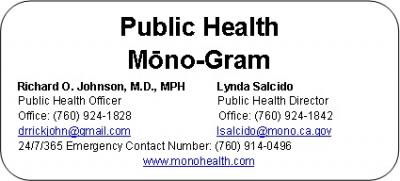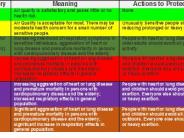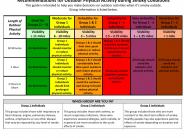Mono-Gram - Wildfire Smoke 8/21/2015
Health Advisory – Wildfire Smoke
Stage 1 Health Advisory
Affected Communities: Owens Valley and Mono County Communities
Smoke Source: Multiple fires including Rough Fire
Based on air pollution levels at 1:00 PM on August 21, 2015 a Stage 1 Air Pollution Health Advisory (Unhealthy for Sensitive Groups) has been issued for Owens Valley and Mono County communities. Due to elevated particulate pollution levels, children, the elderly, people with heart or lung problems, or people with current illnesses such as the flu, are advised to stay indoors and avoid strenuous outdoor activities in the impacted areas. If you have any questions please call the Great Basin Air Pollution Control District office in Bishop at 760-872-8211.
Health advisories on the web: http://www.gbuapcd.org/healthadvisory
Rough Fire air impacts: http://www.gbuapcd.org/Roughfire.htm
Hourly PM10 graphs: http://www.gbuapcd.org/data
Although not yet as bad as in the last few years, residents and visitors to the Eastern Sierra are experiencing smoke coming through the passes from various fires. It is likely that smoke will continue to pose a risk to us in the days to come. Keep in mind that this is a very fluid and ever changing situation, dependent on the fires, control efforts, and the wind.
Some communities have access to continuous particulate matter (PM) monitoring through the Great Basin Unified Air Pollution Control District (GBUAPCD). These monitors provide an instant reading of particulate matter concentrations averaged over one hour. It is these fine particles which are contained in wildfire smoke which make it so hazardous to our health.
For an up-to-date look at particulate levels in areas that are monitored, go to:
www.gbuapcd.org/data/index.htm
It is predicted that levels will be in the “moderate” to “Unhealthy for Sensitive Groups” range over the next few days in many areas of the Eastern Sierra, with significant hour-to-hour variations based on the wind and fire conditions.
Areas without monitoring need other ways to estimate particle levels. In these areas, refer to the following chart for guidance: http://www.gbuapcd.org/healthadvisory/AQI_Visibility.pdf
What does this mean for you?
You can expect increased respiratory symptoms (e.g., watery and itchy eyes, congestion, sore throat, cough), and if you have any heart or lung disease, including asthma, are elderly, are very young, or are pregnant, you can expect worsening of your symptoms or condition.
People with heart or lung disease (including asthma), the elderly, children, and pregnant women should AVOID prolonged or heavy exertion. The general public should limit prolonged or heavy exertion as much as possible.
You should stay indoors, with windows and doors closed tightly. Turn the A/C onto re-circulate, or use ceiling or portable fans, but not anything that sucks outside air into the home.
Avoid tobacco smoke, frying or broiling foods, burning candles, vacuuming, and using paints, solvents, cleaning products, and adhesives indoors.
Keep a good supply of medication available, and have a supply of non-perishable groceries that do not require cooking.
Keep your airways moist by drinking plenty of water. Masks will not work to filter out the small articles.
If you have symptoms of lung or heart disease that may be related to excess smoke exposure, including repeated coughing, shortness of breath or difficulty breathing, wheezing, chest tightness or pain, palpitations, nausea or unusual fatigue or lightheadedness, CONTACT YOUR HEALTHCARE PROVIDER.
Some additional considerations:
If you are in a high-risk group and sensitive to the effects of smoke, with ongoing symptoms, you may want to consider along with your healthcare provider the option of leaving the area for a week or two, allowing your symptoms to improve while the smoke clears.
Please remember to check on any of your friends, neighbors, or family that may be more vulnerable to the effects of smoke, and may need assistance in some way from someone like yourself who is blessed with more resources.
If you think you may need assistance, don’t hesitate or be afraid to reach out to those who are available to help you. It’s always best to have your communication links established before you actually are in crisis and need help.
Recommendations for Minimizing Smoke Exposure:
1. Stay indoors with windows and doors closed; run air-conditioner on “recirculate” setting. Minimize the use of swamp coolers. If it becomes too warm indoors, individuals may consider leaving the area to seek alternative shelter.
2. When driving make sure to drive with the windows rolled up and the air conditioner on “recirculate.”
3. Minimize or stop outdoor activities, especially exercise, during smoky conditions.
4. People who must spend time outdoors should drink plenty of fluids.
5. Additionally, pet owners should consider bringing their pets indoors out of the unhealthy air conditions, if possible. This is especially important for older pets.
6. Stay tuned to local radio and TV for emergency announcements about air quality.
The GBUAPCD and the Health Department will continue to monitor the air quality situation and provide updates to this advisory as needed.




